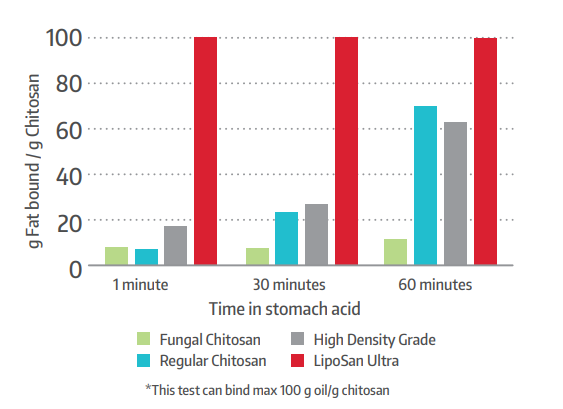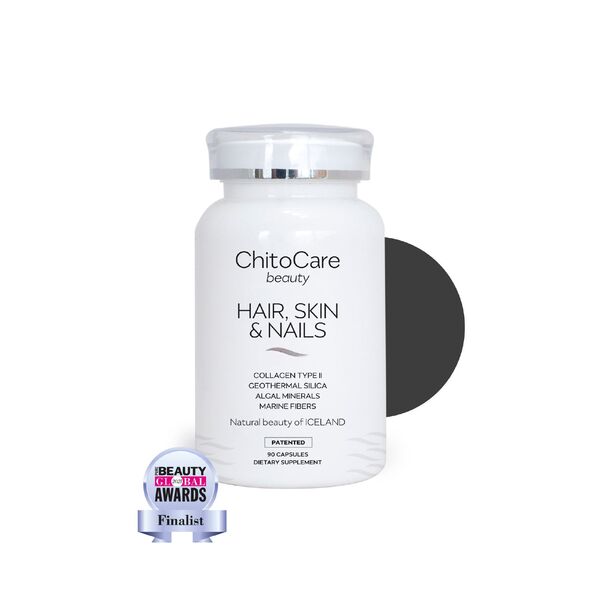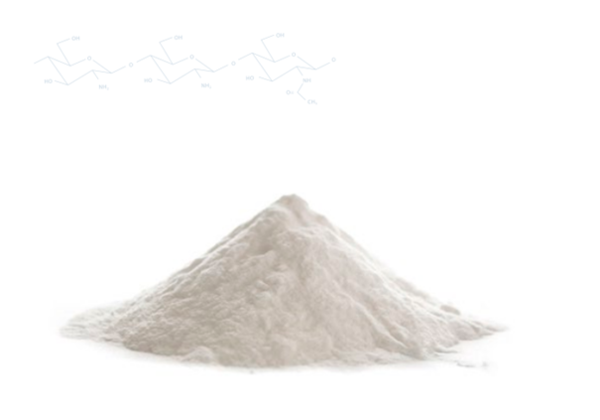Chitosan Applications in Dietary Supplements and Nutraceuticals
Chitosan has been demonstrated to possess several biological properties, with many of them useful for the food and nutrition industry: biodegradable, antioxidative, emulsifying, flocculating, film-forming, fat-binding, and antimicrobial.
Chitosan and the dietary supplements and nutraceuticals market
Chitosan is a biopolymer derived from chitin. Chitin is the second-most abundant polysaccharide in the world, topped only by cellulose, and can be found in invertebrates, insects, algae, and fungi.
Thanks to its many health benefits, chitosan has already been used as a primary source for several health-related applications, with products existing in localized markets in Asia (Japan, China, India, Korea), Europe (Iceland, Germany, Sweden, Netherlands) and the US, while China is predicted to be the largest consumer of nutraceuticals by 2030.
Chitosan properties
Chitosan has been demonstrated to possess several biological properties, with many of them useful for the food industry: biodegradable, antioxidative, emulsifying, flocculating, film-forming, fat-binding, and antimicrobial. Due to its fat-binding properties, chitosan can contribute to weight management, and be hypolipidemic, hypocholesterolemic and antihypertensive. Indeed, chitosan can chelate fat and reduce cholesterol [3-4], but does not influence calcium, magnesium and iron status (based on 936 mg daily dose in an 8-week elderly study, [5]). According to EFSA, a daily consumption of 3-g chitosan will contribute to the maintenance of normal blood LDL cholesterol concentrations. Read the full brochure.
Other chitosan properties include:
- Biodegradability
- Biocompatibility
- Non-toxicity
- Immune system stimulation
Possible fields of chitosan application
Chitosan has a plethora of applications, but the above-mentioned properties make it an exceptional component for use in nutraceuticals, dietary supplements and functional foods. Interactions between functional food components, such as prebiotics, probiotics, phytochemicals, and intestinal microbiota, have consequences on human health.
The term “nutraceutical” is a combination of the words “nutrition” and “pharmaceutical” and refers to substances, foods or food products with physiological or health benefits. Nutraceuticals and dietary supplements contain nutrients or substances with a specific purpose. They are often used as alternatives to pharmaceutical products, as they are considered a more natural means to support specific physiological functions.
Functional ingredients or foods and dietary or food supplements may have two functions:
- basic nutrients needed by our body and provided by supplementation
- nutrients that support to some extent physiological functions
Functional foods have not as yet been defined by legislation in Europe. Generally, they are considered as those foods which are intended to be consumed as part of a normal diet and that contain biologically active components which offer the potential of enhanced health or reduced risk of disease. Examples of functional foods include foods that contain specific minerals, vitamins, fatty acids or dietary fibers, foods with added biologically active substances, such as phytochemicals or other antioxidants, and probiotics that have live beneficial cultures.
Dietary supplements (also called food supplements or nutritional supplements) are products designed to give you nutrients that might be missing from your diet. They are intended to correct nutritional deficiencies, maintain an adequate intake of certain nutrients, or to support specific physiological functions. They are usually taken as tablets, capsules or powders, or as a liquid.
Chitosan bioactivities
Thanks to its bioactive properties, chitosan can prove effective as a preventive and health-enhancing nutrient. Some core chitosan bioactivities with potential application include:
- Antimicrobial
- Anti-inflammatory
- Antioxidant
- Mucoadhesive
- Fat-binding
Chitosan characterization
The intrinsic properties of chitosan vary with the molecular weight (MW) and degree of deacetylation. As these affect chitosan's functional properties, polymer characterization is crucial. Chitosan's ability to be modified to extend its applicability is one of the many reasons it is considered such an appealing, multifunctional polymer.

Chitosan properties for weight management application
Chitosan's many and appealing properties make it well suited for use in dietary supplements. Considering that obesity is a well-established risk factor for cardiovascular disease, diabetes, hyperlipidaemia, hypertension, osteoarthritis, and strokes, chitosan can prove tactical in providing weight management solutions, while promoting calorie restriction to enhance overall wellness.
Unlike cellulose, chitosan is soluble in acidic environment following its protonation (with positive charge), resulting in its unique cationic and bioactive nature. This characteristic offers great potential as a dietary fiber since chitosan will first dissolve in stomach acid and become soluble and viscous, behaving like a soluble fiber. Transiting from the stomach to the intestine, the higher pH will cause it to gel and become less soluble, contributing to faster transit time and reduced putrefactive activity. This is advantageous because rapid intestinal transit is linked to higher energy recoveries by the host due to increased bacterial metabolite production in the colon.
As a fibrous substance, chitosan can assist with weight management thanks to its ability to bind upon ingestion with dietary fats, cholesterol, bile acid and gut toxins, and has been shown to lower cholesterol, systolic and diastolic blood pressure. As a source of dietary fiber, chitosan can be degraded by the gut microbiota producing short chain fatty acids. It can therefore modulate good bacteria and have a positive effect on colonic health.

Chitosan-based products
Nutraceuticals and dietary supplements are a growing market and will see the development and application of chitosan thrive because of a growing demand for health-enhancing products, and a demand for cheaper and greener commercial polymers.
Thanks to its versatile and eco-friendly nature and its abundant raw material source from chitin, chitosan is fast becoming a natural ingredient for nutraceutical and dietary supplement use. Chitosan has great potential for application across several different product groups and can be developed into different formats – from gels, solutions and liquids to powders, tablets, edible films, and nanoparticles. Chitosan has also found applications in nutrient and bioactive compound encapsulation and delivery for products with other active ingredients.

Summary
With chronic diseases such as coronary heart disease, hypertension, obesity, cancer, diabetes and osteoporosis on the rise, more and more people are willing and ready to make lifestyle changes that will positively affect their health. The global public healthcare crisis, an increasing desire for more eco-friendly products and advances in technology are making nutraceuticals and dietary supplements a rapidly growing market and a valuable addition to human health management and wellness.
Primex, an Icelandic biotechnology company and world leader in the production of high-quality chitosan, has already successfully used chitosan in its dietary supplements, LipoSan Ultra®and ChitoCare Beauty Hair, Skin & Nails.
For further information on how Primex can assist you with your chitosan needs or if you have any questions, do not hesitate to get in touch.

